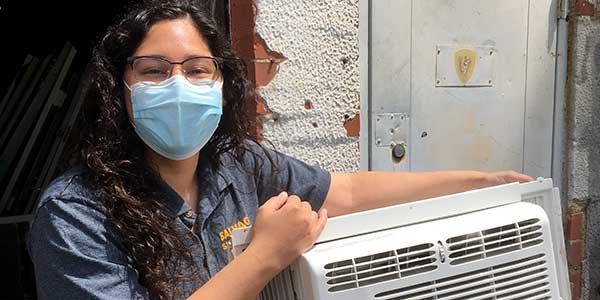
September 20, 2021
Have you removed your window or in-room A/C unit yet in preparation for cooler fall weather? If you’re thinking of upgrading or getting rid of your current A/C units, consider donating them to Community Forklift!
Every summer, Community Forklift provides dozens of free air conditioners to households with limited incomes through our Home Essentials Program. And every summer, the waitlist and demand for units outpaces our supply!
Hola Cultura recently published a three-part report on summer temperatures in D.C., the connection between heat and our health, and how we can cool down D.C. residents. Check out their findings and learn how heat extremes affect the health of children, the elderly and pregnant, and people with chronic health problems.
We hope to alleviate these issues by diverting useable air conditioning units from the landfill and providing them for free or at low cost to those that need them — and you can help! Here’s how:
- DONATE: You can donate unneeded window or in-room air conditioning units (under 10 years of age and including all their pieces) at our reuse warehouse in Hyattsville, MD. We are open Monday through Sunday, 12 to 5 pm.
- FUND THE CAUSE: Help us buy new units to donate directly to a Home Essentials client! When donating money through our online contribution form, add a note in the comments section that you’d like your contribution to go to the HELP program.
- BUY AND DONATE A NEW A/C UNIT: If you don’t have a used A/C unit to donate, we also accept new ones! Just drop it off at the reuse warehouse any day between 12 and 5 pm and pick up your receipt for your tax-deductible donation.
- SPREAD THE WORD: Do you know of someone who might have an air conditioner to donate? Let your family, friends, and neighbors know that we can put it to good use!
Thank you for helping us lift up our community through reuse!
***
Every donation and purchase helps us lift up local communities through reuse. Community Forklift turns the construction waste stream into a resource stream for communities in the DC region – by keeping perfectly good items out of the landfill, preserving historical materials, providing low-cost building supplies, and creating local green jobs.

